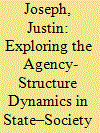| Srl | Item |
| 1 |
ID:
172295


|
|
|
|
|
| Summary/Abstract |
Based on the data from the 13-month field visit spread over two trips (September 2016 to December 2016 and September 2017 to July 2018), this study highlights how securitisation efforts from the central government interact with environmental non-governmental organisation (ENGO) activism and advocacy in China, producing diverse outcomes across temporal and spatial dimensions. The trajectory of state–society relations in the context of environmental governance depends on (a) the ability of party-state to control ‘new media’ activism and manage ENGO advocacy to ‘maintain stability/rule by law’ and (b) ability of the assemblage of media activism and ENGO advocacy, along with other agents, to support the transition from ‘rule by law’ to ‘rule of law’. The overall findings are discussed in the context of the ‘Copenhagen School’ framework in International Relations Theory to examine the process of securitisation in the environmental sector in China. The securitising actor (the one who leads the process of securitisation such as States), referent object (the object under existential threat, i.e. human nature harmony) and functional actors (those who support or oppose the process of securitisation, i.e. ENGOs) are the major players involved.
|
|
|
|
|
|
|
|
|
|
|
|
|
|
|
|
| 2 |
ID:
187369


|
|
|
|
|
| Summary/Abstract |
The environmental sector is an interesting realm in Chinese politics to observe factors such as the contributions of new media activism in bottom-up communication and decision-making processes, especially during the 40 years of reform and opening up. Top-down efforts to curb environmental issues are primarily to address increasing pubic discomfort due to pollution and related problems. However, environmental movements are increasingly visible in China despite their application of stability maintenance mechanisms such as Environmental Police. It is therefore noteworthy to deeply analyse the factors that contribute to the increasing scale of movements in the country. This study examines the role of new media activism (occurring due to the public’s interactions through WeChat, Weibo, QQ, etc.) in shaping the trajectory of environmental movements in China. How are these avenues supporting alternative communication channels outside the mainstream policy making apparatus? Is the government willing to incorporate the interests developed in these channels to policymaking realms? How these behavioural changes are influencing the state–society relations in contemporary China in the context of increasing environmental concerns. The study employs agency-structure framework to analyse the interactions between new media activism and the single party ruling political structure with the support fieldwork data from China. The study examines policy documents, official declarations of the communist party, public attitude towards new media activism, and so on, in order to present a comprehensive understanding on the politics of ecology in the PRC.
|
|
|
|
|
|
|
|
|
|
|
|
|
|
|
|